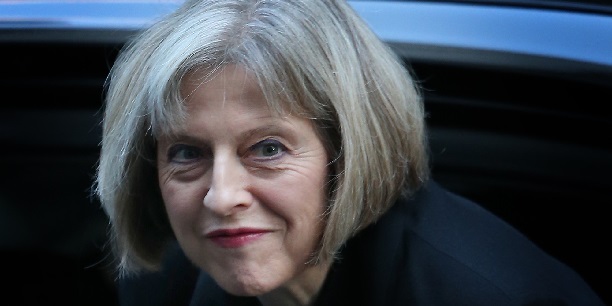Theresa May has said she will put together a government with the support of the Democratic Unionists that can provide "certainty" for the future.
Speaking after visiting Buckingham Palace, she said only her party had the "legitimacy" to govern, despite falling eight seats short of a majority.
Later, she said she "obviously wanted a different result" and was "sorry" for colleagues who lost their seats.
But Labour said they were the "real winners".
The Lib Dems said Mrs May should be "ashamed" of carrying on.
The Tories needed 326 seats to win another majority but, with 649 out of the 650 seats declared, they fell short and must rely on the DUP to continue to rule.
In a short statement outside Downing Street, which followed a 25-minute audience with The Queen, Mrs May said she would join with her DUP "friends" to "get to work" on Brexit.
She said he intended to form a government which could "provide certainty and lead Britain forward at this critical time for our country".
Referring to the "strong relationship" she had with the DUP but giving little detail of how their arrangement might work, she said the government would "guide the country through the crucial Brexit talks" that begin in just 10 days' time.
"Our two parties have enjoyed a strong relationship over many years," she said.
"And this gives me the confidence to believe that we will be able to work together in the interests of the whole United Kingdom."
Later, she told reporters that she "wanted to achieve a larger majority but that was not the result".
"I'm sorry for all those candidates who weren't successful, and sorry for MPs who were ministers who lost their seats. As I reflect on the results, I will reflect on what I need to do to take the party forward."
A cabinet reshuffle, expected later today, looks likely to be pushed back to Saturday, says BBC political correspondent Eleanor Garnier.
Chancellor Philip Hammond, Home Secretary Amber Rudd and Foreign Secretary Boris Johnson are "potentially" safe, she said, but those rarely seen on the campaign trail, including Andrea Leadsom, Priti Patel and Liam Fox, could be out.
Comebacks from Iain Duncan Smith, Michael Gove and prominent leave campaigner Dominic Raab were being floated, she adds.
DUP leader Arlene Foster confirmed that she had spoken to Mrs May and that they would speak further to "explore how it may be possible to bring stability to this nation at this time of great challenge".
While always striving for the "best deal" for Northern Ireland and its people, she said her party would always have the best interests of the UK at heart.
It is thought Mrs May will seek some kind of informal arrangement with the DUP that could see it "lend" its support to the Tories on a vote-by-vote basis, known as "confidence and supply".
Conservative MP Dominic Raab said the country needed "certainty and direction", and an agreement between the Conservatives and the Democratic Unionist Party was the "only viable option".
The BBC's Laura Kuenssberg said the PM had returned to No 10 a "diminished figure", having ended up with 12 fewer seats than when she called the election in April.
She had called the election with the stated reason that it would strengthen her hand in negotiations for the UK to leave the EU - the talks are due to start on 19 June.
But with the London seat of Kensington yet to declare, the Tories are on 318 seats, ahead of Labour on 261, the SNP 35 and the Lib Dems on 12. The DUP won 10 seats.
As it stands, the Tories and the DUP would have 328 MPs in the Commons, giving it a wafer-thin majority although as Sinn Fein will not be taking its seven seats, the new administration will have slightly more room for manoeuvre.

The Conservatives have argued in the event of a hung Parliament, Mrs May gets the opportunity to form a government first, as her predecessor David Cameron did in 2010 when there was also no clear winner but the party had comfortably more seats than their nearest rival.
Labour has said it is also ready to form a minority government of its own, after far exceeding expectations by picking up 29 seats in England, Wales and Scotland.
But even if it joined together in a so-called progressive alliance with the SNP, Lib Dems, Green Party and Plaid Cymru, it would only reach 313 seats - well short of the 326 figure needed.
Â





